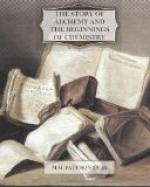to mean “belonging to a lofty place”;
others say it signifies “greater than Celsus,”
who was a celebrated Latin writer on medicine of the
1st century. Paracelsus studied at the University
of Basle; but, getting into trouble with the authorities,
he left the university, and for some years wandered
over Europe, supporting himself, according to one
account, by “psalm-singing, astrological productions,
chiromantic soothsaying, and, it has been said, by
necromantic practices.” He may have got
as far as Constantinople; as a rumour floated about
that he received the Stone of Wisdom from an adept
in that city. He returned to Basle, and in 1527
delivered lectures with the sanction of the Rector
of the university. He made enemies of the physicians
by abusing their custom of seeking knowledge only
from ancient writers and not from nature; he annoyed
the apothecaries by calling their tinctures, decoctions,
and extracts, mere soup-messes; and he roused
the ire of all learned people by delivering his lectures
in German. He was attacked publicly and also
anonymously. Of the pamphlets published against
him he said, “These vile ribaldries would raise
the ire of a turtle-dove.” And Paracelsus
was no turtle-dove. The following extract from
(a translation of) the preface to The Book concerning
the Tinctures of the Philosophers written against
those Sophists born since the Deluge, shews that
his style of writing was abusive, and his opinion
of himself, to say the least, not very humble:—
“From the middle of this age the Monarchy of all the Arts has been at length derived and conferred on me, Theophrastus Paracelsus, Prince of Philosophy and Medicine. For this purpose I have been chosen by God to extinguish and blot out all the phantasies of elaborate and false works, of delusive and presumptuous words, be they the words of Aristotle, Galen, Avicenna, Mesva, or the dogmas of any among their followers. My theory, proceeding as it does from the light of Nature, can never, through its consistency, pass away or be changed; but in the fifty-eighth year after its millennium and a half it will then begin to flourish. The practice at the same time following upon the theory will be proved by wonderful and incredible signs, so as to be open to mechanics and common people, and they will thoroughly understand how firm and immovable is that Paracelsic Art against the triflings of the Sophists; though meanwhile that sophistical science has to have its ineptitude propped up and fortified by papal and imperial privileges.... So then, you wormy and lousy Sophist, since you deem the monarch of Arcana a mere ignorant, fatuous, and prodigal quack, now, in this mid age, I determine in my present treatise to disclose the honourable course of procedure in these matters, the virtues and preparation of the celebrated Tincture of the Philosophers for the use and honour of all who love the truth, and in order that all who despise the true arts may be reduced to poverty.”
The turbulent and restless spirit of Paracelsus brought him into open conflict with the authorities of Basle. He fled from that town in 1528, and after many wanderings, he found rest at Salzburg, under the protection of the archbishop. He died at Salzburg in 1541, in his forty-eighth year.




